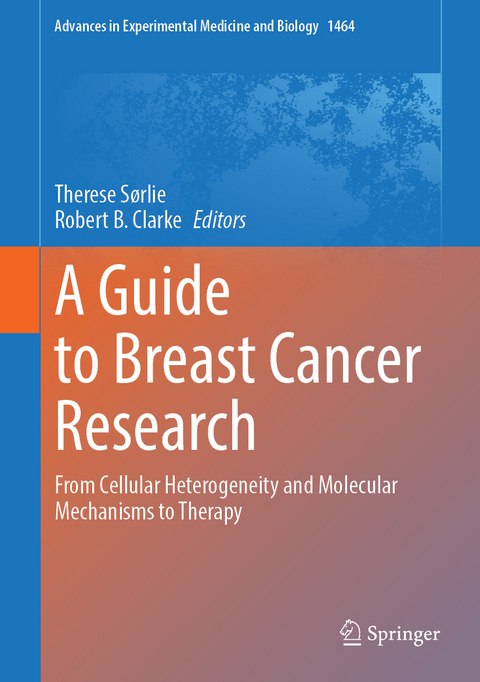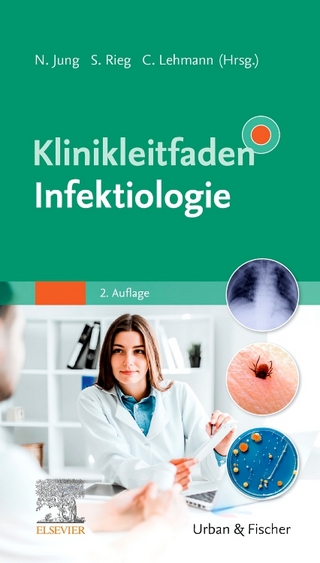
A Guide to Breast Cancer Research
Springer International Publishing (Verlag)
978-3-031-70874-9 (ISBN)
- Noch nicht erschienen - erscheint am 15.02.2025
- Versandkostenfrei innerhalb Deutschlands
- Auch auf Rechnung
- Verfügbarkeit in der Filiale vor Ort prüfen
- Artikel merken
The book presents key topics at the forefront in breast development and cancer research in chapters authored by leading scientists in the field.
The chapters provide a basis for understanding major concepts, model systems, cells of origin and heterogeneity in human breast development and cancer. The book builds on this understanding to guide readers through the cellular and molecular basis of breast cancer and the most important signaling pathways. Finally, the book describes mechanisms of metastasis and cancer immunity, and treatment options and resistance to therapy.
It is targeted at young scientists and early career researchers and provides an overview of current topics in breast cancer research. Each chapter includes key learning points, boxes and conclusions to highlight the most important information. This book will interest anyone who wants to learn about the main areas of breast cancer research and the most important recent advances.
Therese Sørlie is Head of Department of Cancer Genetics, Institute for Cancer Research at Oslo University Hospital and she is Associate Professor in Cancer Genetics at Oslo University. She received a young investigator grant from the Norwegian Research Council and has led her own research group since 2012. She is a member of the European Network for Breast Development and Cancer. Therese Sørlie's work includes contribution to the pioneering gene expression studies of breast tumors that has resulted in a classification scheme that is implemented in international guidelines for treatment of breast cancer. Her research interest is on breast tumor initiation and progression; from cells of origin, the specific pathways and processes that are deregulated in the further progression of the intrinsic subtypes, to the specific events that are essential for the transition from in situ to invasive cancer.
Rob Clarke is a Professor of Breast Biology at the University of Manchester and is currently Director of the Manchester Breast Centre, which comprises 40 academics active in breast research. Rob was awarded a Cancer Research Campaign Fellowship which established the Breast Biology Group that he has led for over 20 years. He is a co-founder of the European Network for Breast Development and Cancer and the EuroPDX Consortium. Rob's research achievements include the first use of Ki67 as a proliferation biomarker in neoadjuvant tamoxifen and fulvestrant studies, the discovery of the importance of paracrine signaling in normal breast epithelium including EGF and Notch pathways and establishing the roles of stem cell signaling pathways including cytokines in breast cancer therapy resistance and metastasis. Rob has over 170 peer-reviewed publications in these areas of research.
Part I: Development and cancer: basic concepts.- Chapter 1: Introductory chapter by Sorlie and Clarke.- Chapter 2: Embryonic mammary gland morphogenesis.- Chapter 3: Breast morphogenesis: from normal development to cancer.- Chapter 4: Single-Cell Analysis in the Mouse and Human Mammary Gland.- Part II: Development and cancer: model systems and approaches.- Chapter 5: Recording lineage history with cellular barcodes in the mammary epithelium and in breast cancer.- Chapter 6: Models for studying ductal carcinoma in situ progression.- Chapter 7: Patient-derived xenografts of breast cancer.- Chapter 8: Rat Models of Breast Cancer.- Part III: Development and cancer: cells of origin and heterogeneity.- Chapter 9: Cells of origin of breast cancer and intertumoral heterogeneity.- Chapter 10: Mechanisms of regulation of cell fate in breast development and cancer.- Chapter 11: Classification of breast cancer through the perspective of cell identity models.- Part IV: Cellular and molecular basis.- Chapter 12: The Microenvironment in DCIS and its Role in Disease Progression.- Chapter 13: Molecular basis of breast tumor heterogeneity.- Chapter 14: E-cadherin-mediated cell-cell adhesion and invasive lobular breast cancer.- Part V: Signalling pathways.- Chapter 15: Hormone signaling in breast development and cancer.- Chapter 16: RANK/RANKL signaling pathway in breast development and cancer.- Chapter 17: Metabolic Reprogramming and Adaption in Breast Cancer Progression and Metastasis.- Part VI: Metastasis and immunity.- Chapter 18: Microenvironmental regulation of dormancy in breast cancer metastasis: "An ally that changes allegiances".- Chapter 19: The Roles of Myeloid Cells in Breast Cancer Progression.- Chapter 20: Immune microenvironment in breast cancer metastasis.- Part VII: Subtypes, treatment and resistance.- Chapter 21: Clinical Implications of Breast Cancer Intrinsic Subtypes.- Chapter 22: Targeting Estrogen Receptor signalling in breast cancer therapy.- Chapter 23: CDK4/6 inhibitor resistance in ER+ breast cancer.- Chapter 24: HER2-positive breast cancer treatment and resistance.
| Erscheint lt. Verlag | 15.2.2025 |
|---|---|
| Reihe/Serie | Advances in Experimental Medicine and Biology |
| Zusatzinfo | XVII, 525 p. 76 illus., 72 illus. in color. |
| Verlagsort | Cham |
| Sprache | englisch |
| Maße | 178 x 254 mm |
| Themenwelt | Medizin / Pharmazie ► Medizinische Fachgebiete ► Onkologie |
| Studium ► Querschnittsbereiche ► Infektiologie / Immunologie | |
| Schlagworte | Biomarkers • breast cancer genes • breast cancer metastasis • cells of human breast • embryonic development • model systems • mutational signature • signaling pathways • Stem Cells • Subtypes • therapy resistance • Tumor heterogeneity |
| ISBN-10 | 3-031-70874-1 / 3031708741 |
| ISBN-13 | 978-3-031-70874-9 / 9783031708749 |
| Zustand | Neuware |
| Informationen gemäß Produktsicherheitsverordnung (GPSR) | |
| Haben Sie eine Frage zum Produkt? |
aus dem Bereich


